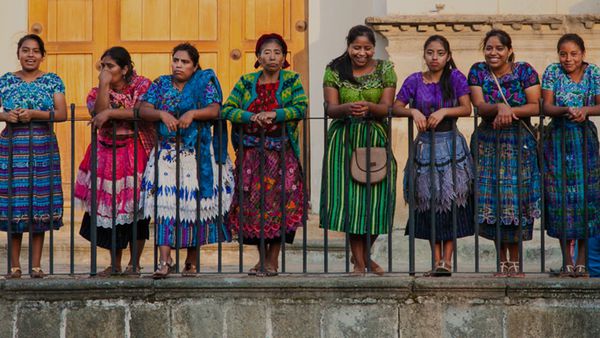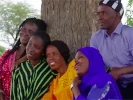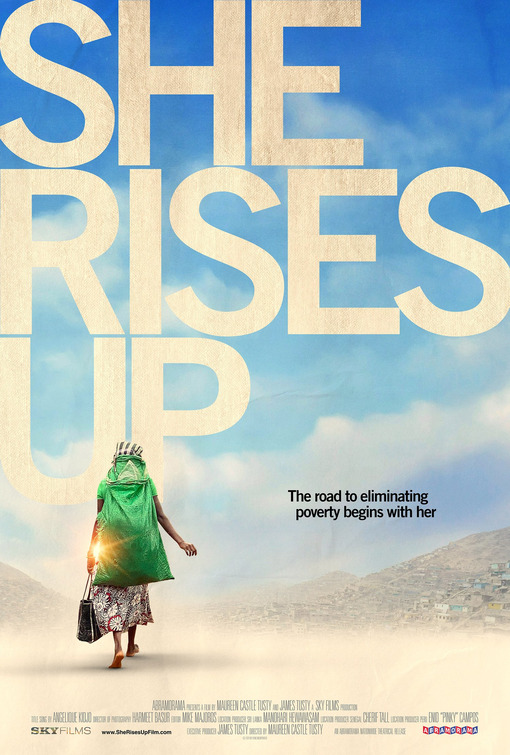Eye For Film >> Movies >> She Rises Up (2024) Film Review
She Rises Up
Reviewed by: Jennie Kermode

It’s a little-publicised fact that if you want to combat poverty, global inequality and even climate change, one of the best things you can do is to invest in educating girls. That’s because when women succeed economically, whole communities benefit, and women’s decisions are far better at prioritising infrastructure development and mitigating long term risk. There’s still academic debate over why this happens – whether it’s nature or nurture – but it’s a real source of hope for the future. This documentary meets three women – one in Senegal, one in Sri Lanka and one in Peru – who have carved out their own paths and empowered those around them.
Senegalese women are frequently denied employment in a society which favours men, Magatte Wade explains – so they become entrepreneurs. Market trading is the most common route, the easiest one to get into, even if it doesn’t generate much income. The will and the talent are there. By starting up a cosmetics company, she has been able to create opportunities for others and illustrate what’s possible.

“If you have a heart for the poor, that’s easy, but if you have a mind for the poor, that’s the challenge,” she says. Want to stop people from dying in desperate attempts to cross the sea into Europe? One way to do it is to create opportunities for them at home. She argues that people assume that certain African countries are corrupt because they are poor, whereas in fact they are poor because they are corrupt. What they need is a fresh approach to regulation, and authorities which will actually enforce the law, no matter who is involved. Authorities with the backbone to stand up to foreign multinationals which demand special treatment and squeeze out small local businesses.
One cannot imagine that this endears her to people already in authority, but we don’t see much about that side of the story. Director Maureen Castle Tusty focuses firmly on the positive. Whilst this might make the documentary feel a little unbalanced, it’s countering the weight of many more cynical takes, so that seems reasonable enough. There’s energetic music and a lot of bright colour right from the start. Tusty wants to celebrate these women, something that we really don’t see enough of elsewhere.
It’s not that there is no acknowledgement of problems, simply that they are presented in the context of finding solutions. Selyna Peiris, who has dedicated herself to expanding her mother’s textile production business in Sri Lanka, looks at the need for different approaches to work in order to create opportunities for women, such as flexible hours to fit around childcare commitments. Some of her employees take work home, but others have met with violence from their husbands when doing so. She stresses the importance of fostering honest communication, giving them the confidence to speak up about problems and finding bespoke ways of working around them.
A major problem for girls and women worldwide is menstrual poverty, which can take them out of education or work due to a combination of concerns about hygiene and shame. Developing a safely reusable menstrual pad might seem like a small thing, but it’s a female-driven project with the potential to transform the lives of millions of other women – and, in so doing, vastly increase economic productivity, breaking the cycle of poverty. There are initiatives like this in various parts of the world, but by making it specific and personal, Tusty makes it easier for viewers to recognise as a real, practical thing, getting immediate results.
For Gladys Yupanqui, a mini-market owner in Peru, the challenge is not so much about overcoming generations of poverty as about reconstruction. Damage done by Shining Path guerillas in the Eighties continues to have consequences, both for infrastructure and in terms of individual trauma and loss. People need to recover their confidence in what it’s possible to achieve, and feel able to invest financially in the future. Incorporating elements of tradition such as dance, Gladys brings a cultural element into her economic project, giving local people a sense of ownership and connection which helps them to move forwards.
What do all these projects mean to the women involved? Magatte, Selyna and Gladys are all sharp witted, strong willed individuals who would shine in any context, but they’ve still found themselves changed by their journeys, and more so some of the women around them. Economic success means being listened to and taken more seriously, they point out. It means that one doesn’t have to put up with mistreatment any more. Perhaps it could do the same thing for the countries where these women live.
Reviewed on: 20 Jun 2024
















